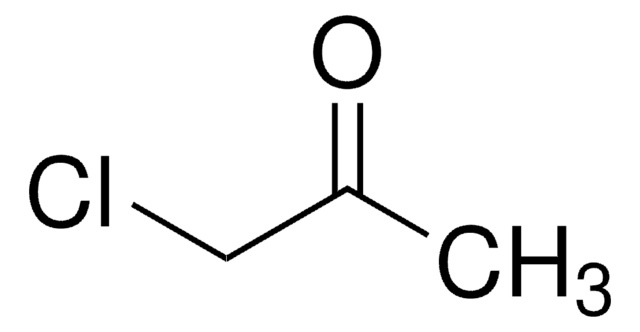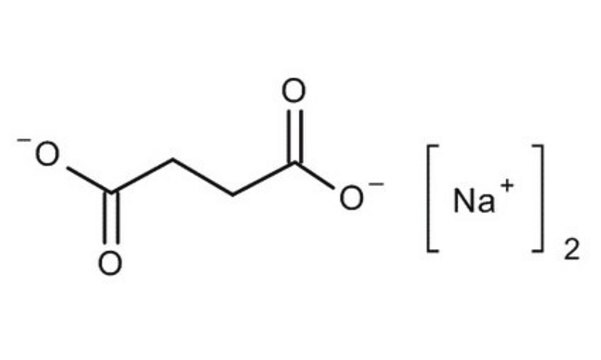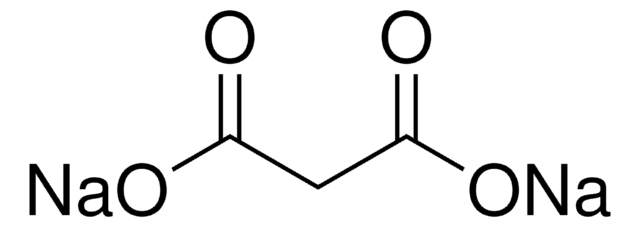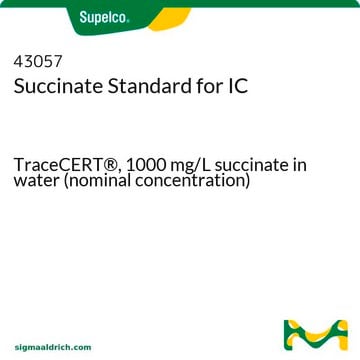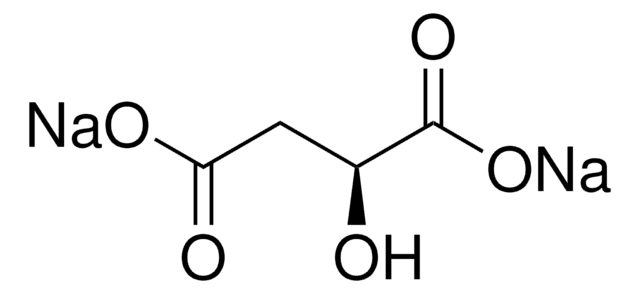14160
Sodium succinate dibasic
purum, anhydrous, ≥98.0% (NT)
Synonym(s):
Anhydrous butanedioic acid disodium salt, Succinic acid disodium salt
Sign Into View Organizational & Contract Pricing
All Photos(1)
About This Item
Linear Formula:
NaOOCCH2CH2COONa
CAS Number:
Molecular Weight:
162.05
Beilstein:
3917246
EC Number:
MDL number:
UNSPSC Code:
12352100
PubChem Substance ID:
NACRES:
NA.22
Recommended Products
Quality Level
grade
purum
Assay
≥98.0% (NT)
SMILES string
CC(=O)CCc1ccc(O)cc1
[Na+].[Na+].[O-]C(=O)CCC([O-])=O
InChI
1S/C4H6O4.2Na/c5-3(6)1-2-4(7)8;;/h1-2H2,(H,5,6)(H,7,8);;/q;2*+1/p-2
InChI key
ZDQYSKICYIVCPN-UHFFFAOYSA-L
Looking for similar products? Visit Product Comparison Guide
Application
Sodium succinate dibasic can be used:
- As a liquid phase in the study of basic properties of α-tricalcuim phosphate-based cement.
- To prepare succinato-bridged copper(II) complexes exhibiting magnetic properties.
Storage Class Code
11 - Combustible Solids
WGK
WGK 1
Flash Point(F)
Not applicable
Flash Point(C)
Not applicable
Personal Protective Equipment
dust mask type N95 (US), Eyeshields, Gloves
Choose from one of the most recent versions:
Already Own This Product?
Find documentation for the products that you have recently purchased in the Document Library.
Customers Also Viewed
Effects of liquid phase on basic properties of α-tricalcium phosphate-based apatite cement
Oda M, et al.
Dental Materials Journal, 27, 672-677 (2008)
Succinato-bridged copper (II) supramolecular 3D framework: Synthesis, crystal structure and magnetic property
Ghoshal D, et al.
Inorgorganica Chimica Acta, 360, 1771-1775 (2007)
Polymeric networks of copper (II) using succinate and aromatic N-N donor ligands: synthesis, crystal structure, magnetic behaviour and the effect of weak interactions on their crystal packing
Ghoshal D, et al.
Dalton Transactions, 27, 1687-1695 (2004)
Makoto Oda et al.
Dental materials journal, 27(5), 672-677 (2008-11-01)
Effects of liquid phase on the basic properties of alpha-tricalcuim phosphate (alpha-TCP)-based cement, BIOPEX, were investigated by employing three liquid phases: distilled water, neutral sodium hydrogen phosphate solution, and succinic acid disodium salt solution containing sodium salt of chondroitin sulfate.
Davide Ret et al.
Carbohydrate polymers, 204, 124-130 (2018-10-28)
The purpose of the present study was the development of an accurate method to determine the degree of substitution (DS) of modified hyaluronic acid (HA) by proton nuclear magnetic resonance (1H NMR) spectroscopy. The influence of the effect of ionic
Our team of scientists has experience in all areas of research including Life Science, Material Science, Chemical Synthesis, Chromatography, Analytical and many others.
Contact Technical Service

